WHO Warns of Potential Polio Outbreak in Middle East Amid Gaza Crisis
WHO alerts to possible polio spread in Middle East as Gaza reports first case in 25 years. Stalled truce talks hinder crucial vaccination campaign, risking regional health crisis.

The World Health Organization (WHO) has issued a stark warning about a potential polio outbreak in the Middle East, following the report of the first case in Gaza in 25 years. This development has raised significant concerns among health officials, who are now scrambling to implement a mass vaccination campaign in the region.
Dr. Hamid Jafari, director of WHO's polio eradication program in the eastern Mediterranean, emphasized the urgency of the situation, stating, "The risk of this virus spreading into Israel, into the West Bank and into surrounding countries like Lebanon, Syria, Egypt and Jordan is high. So we need to act fast." This warning comes as the Global Polio Eradication Initiative, launched in 1988, has successfully reduced polio cases by over 99% worldwide.
The case in Gaza involves a 10-month-old unvaccinated child who developed paralysis in the lower left leg. This incident has prompted the Palestinian Ministry of Health, WHO, and UNICEF to plan two rounds of polio vaccination in the coming weeks. However, the implementation of this crucial campaign faces significant obstacles due to ongoing conflicts in the region.

The destruction of Gaza's healthcare system poses a major challenge to the vaccination efforts. With less than half of the territory's 107 health facilities currently functional, health workers are forced to seek alternative locations for vaccination sites, such as schools, shelters, and community centers.
The WHO aims to vaccinate over 600,000 children in two rounds, targeting a coverage rate of at least 95%. This ambitious goal is complicated by the fact that an estimated 50,000 babies born in Gaza since October 2023 have not been immunized against polio.
"I am gravely concerned that a 10-month-old unvaccinated child from Deir al-Balah, Gaza, has been confirmed to have polio – the first case in Gaza in 25 years."
The vaccination campaign will utilize a new and improved version of the oral polio vaccine (OPV) called NoPV2. This vaccine uses a more genetically stable strain of weakened virus to reduce the risk of vaccine-derived infections, which have caused outbreaks in countries like Yemen, Sudan, and South Sudan.
It's worth noting that while wild poliovirus is now only found in Afghanistan and Pakistan, the strain detected in Gaza is vaccine-derived. This variant can emerge in areas with low vaccination rates, highlighting the importance of maintaining high immunization coverage.
The success of this critical vaccination campaign hinges on the possibility of a ceasefire in the region. Dr. Jafari estimates that a minimum seven-day pause in hostilities is needed to effectively implement the plan. Without such a truce, the risk of polio spreading further in the Middle East remains alarmingly high.
As the situation unfolds, the international community watches closely, hoping for a breakthrough that will allow health workers to carry out this vital mission and prevent a potentially devastating polio outbreak in the region.


































